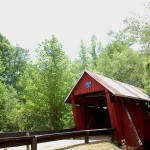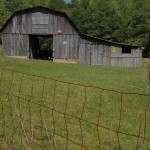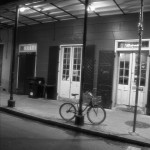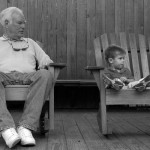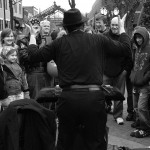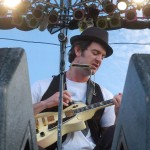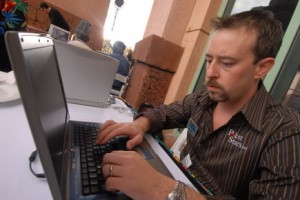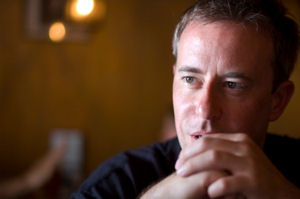Every word of this is true.
The parabolas north and south met in the middle over Greenville, South Carolina. One began over the northern states and drooped down across the Mason Dixon line. The other crept up from the Gulf of Mexico. Even with the television sound muted it was clear the weatherman was telling us to expect something akin to apocalypse. Then he shrugged his shoulders as if to say, “But hey, whatta I know, right?”
As the bread and milk aisles filled up in the grocery store, scientists from around the world prepared to release their report on global warming. The predictions told us that billions of people would suffer from water shortages while my son is still alive. Chaos and disaster, man-made but wrought by nature, they will say.
The smiling man in the expensive suit says my town will freeze over before Thursday. The wild-haired scientists say my world will fall into global warming chaos shortly after I die.
I’m going to go to a poker game.
***
My head was numb and it took me three trips to the car and back into the house to get everything I needed to take with me. The air was frigid–cold enough to keep the drinks in the garage icy and cold enough to remind me that I’d forgotten my jacket. I didn’t go back, instead choosing to shiver my way down the dark highway, hitting every red light as I sped–late–toward the underground room.
The room had been rolling for three hours and I didn’t expect to find a seat when I was buzzed in. The parking lot was full and the room was loud. I was surprised to find the two-seat at the second table open. I slid my money to the dealer and pushed myself down on an uncomfortable chair.
The atmosphere was unremarkable at first. Even when I called a short-stack’s all-in and hit runner-runner to bust his made under-boat, I found no pleasure in it. My opponent, however, looked pained, as if the small amount of money he lost would somehow change his future.
Future, I thought. Which future is that?
***
The door at this game is held tight behind a deadbolt. The windows are covered in black plastic and the parking lot is dark. It’s both a bunker and a shelter. It protects the players from eyes that shouldn’t see and it is a place to hide from the other world–the world where real jobs, real families, and real friends reside. Someone has to recognize your face to let you in. When you go out, the door locks behind you.
Though the room was big, it suddenly seemed full.
A cheer erupted from the table closest to the door and somebody yelled, “Jackpot!” The man in the one-seat held a suited 6-9 and made his ten-high straight flush to win the high-hand jackpot. The man who runs the game announced how much the one-seat had won. Everyone applauded and cursed their bad luck.
***
I was getting no action. I was bored. Something in my head pushed $25 into the pot, an open-raise in a straddled pot with the hammer (7-2), both cards red. The flop came 77Q. We went check, check. The turn was an ace. My opponent led, I raised. He called. The river was a seven. My opponent put out a blocking bet, I raised anyway, he called reluctantly. I didn’t wait for him to table his hand. I turned over the hammer, shrugged as if to say, “Whatta I know, right?” and silently stacked my chips in concert with the table’s tribal chant of “Ham-mer, ha-mer, ham-mer!”
By the time I left the room, I forgot this even happened.
***
The Jester spoke through a mouth of rocks. Though always talking, he might as well have been speaking in tongues, a devotee of August Busch and whatever other assorted manufactured pharmaceuticals he’d found that day.
Though it was below freezing outside, he wore flip-flops, baggy shorts, a wrinkled shirt, and an ear-flapped hunter’s cap. He danced with the music, played air guitar with ping-pong paddles, and spoke in his own language–one I’ve come to call Boomhauer.
I could not understand a word he said. Even if he was standing five feet away and speaking slowly, he was as incomprehensible in speech as the action at the table was in terms of real poker. But every once in a while, he would get up from the table, go over to the side of the room, and start playing guitar. His voice was strong and, suddenly, like Mel Tillis’ transformation from stuttering doofus to country crooner, The Jester was an artist, a bard, a minstrel.
***
Out of the more than 30 people playing and milling around the room, only one of them was a woman. Blonde-haired and beautiful, her innocent face belied her body’s frame. Every male eye followed the cocktail waitress as she moved from player to player, checking on drinks, and giving the players whatever they needed to ply their spirits.
Whether it was the woman in the green tank top, the game of poker itself, or the bunker mentality, the lady’s movements seemed to be the only thing binding the players to their seats. Would but that she could stay, the eight-way pots in hands that have been raised and re-raised to 20 times the big blind might just stay in a locale we could call sane and real.
She sat down quietly next to the game’s owner. Though she’d been working her ass off for the past eight hours, her face still looked clean and serene, if only a little troubled. It was as if she knew what would happen if she left, but she knew she had to go.
She tapped her watch and said just barely loud enough for me to hear it, “Looks like it’s about that time.”
***
Tuesday had turned into Wednesday. There are those who believe the sun and moon were created on Wednesday. Mickey Mouse told us, “Wednesday is Anything Can Happen Day.” To me, it still felt like Tuesday.
My table was the boring one, the one where the jackpots weren’t getting hit, the one where the inability to combat the turn and river made all post-flop play tiresome.
The Jester’s table was different. There was life, hope, and laughter. The jackpot had given the table a different spirit. Out of the corner of my eye, I saw nearly everybody at The Jester’s table stand up at once. Not involved in a hand, I stood and went to take a look.
The chips in the middle of the table sat in piles of green and red, an extraordinarily big pot that made up much of the wealth at the table. The flop was all middle cards with two clubs. Two players were already all-in and Mr. Jackpot was thinking. Finally, he called, making the single pot bigger than his jackpot winnings for the night.
He tabled 56 of clubs, for an open-ended straight draw and low club draw. One opponent turned over pocket kings. The Jester did not reveal his cards but I saw them as he peeled them up. He held A7 of clubs for the nut flush draw.
The drama was over quickly. A red four on the turn and no club on the river pushed the entire pot to Mr. Jackpot and his straight.
That did it. Like the breaking of the seventh seal, like Richie Valens’ plane going down, like that late night phone call to tell you somebody is dead, a line had been crossed. Nothing would be the same, even if we couldn’t immediately figure out the difference.
Although there were thousands upon thousands of dollars on the table, nothing seemed to matter much to the players anymore. Raises of any size were called in seven or eight spots. Pot-sized bets were called with abandon. Chips moved back and forth, formed into huge towers, and destroyed just as fast. Sodom, Gomorrah, and Skull Island had nothing on the chaos inside that little room.
***
“Who has a dick so short they can’t hit the fucking toilet?”
The scream came across the room, a crude but seemingly appropriate reprimand to whoever pissed all over the ladies room floor. I’m not sure why we’d all been using the ladies room, but we had, and it was a mess. The floor was a puddle and littered with paper towels. A sign hung above the open tank: “Please don’t put paper towels in the toliet (sic). Thanks, The Management.”
While somewhat interested in identifying the offender, I was more caught up watching the beginning of a discussion between Mr. Jackpot and The Jester. Though they were being quiet, I could tell by the looks on their faces, the closeness of their chests, and the rapid movements of their hands, something wasn’t right.
I looked back to see my first ace-paint in an hour. Because I’ve been made to understand ace-jack is gold, I raised the straddle to $20. The player to my left min-raised. The player in the ten-seat who had proven himself willing to play any two cards to a re-raise, called. I knew I was behind but, hoping in one hand and puking in the other, tossed out my call.
That’s when the screaming started.
Half the room followed the yelling and ran for the front door.
“Should we pause the action?” asked the re-raiser. I agreed we should but said I wasn’t moving from my seat. One thing I like about this particular room is that the dealers are top notch. They are always calm, smart, and on top of things. I’m never worried about the game going astray. The dealer this night was no different. He paused the action but kept his seat to keep an eye on the money and cards.
It was apparent that the discussion between Mr. Jackpot and The Jester had devolved into something that threatened violence. I didn’t go watch. This would be the third time I’ve been witness to violence or near-violence in a poker room and I know the number one rule: Protect your chips.
Like most disputes, this one was finished almost as soon as it started. Mr. Jackpot, still steaming, walked back into the poker area. The Jester was apparently gone. And, frankly, that had me worried.
When the ten-seat made two little pair to beat my top pair, I didn’t even care. I don’t like people leaving an underground game angry, The Jester had apparently done so, and I said as much to the people around me.
“All it takes is one phone call,” I said, assuming everyone knew what I meant.
I’m not sure anybody heard me, because, again, something in the room had shifted. The testosterone-level was at its peak. In what is often a reserved poker room, players were battling in any way they could. Men with crazed looks and maniacal screams were clashing in a wild dance of doubles ping-pong, slashing the air with their paddles, dancing with each point, cursing at each loss. At some point, a free-weight bench had been put on the other side of the room and grown men were betting on how many times they could bench press 150 pounds. Now no longer in use as a poker table, the empty felt behind us became an arm-wrestling mat and players were testing their strength with the right and left arms.
“I can lift that weight with my dick!” came a scream from across the room.
People had formed a seated gallery around the ping-pong table and were keeping score for the insanity. The Rolling Stones pounded through the speakers, booze was pooling on the floor, beer cans and empty plastic shot glasses littered the carpet.
Every ounce of instinct told me to leave. Poker is a beautifully structured game, but there was nothing in the foundation of this room that made me feel calm. It was a wave of adrenalized war that bore no resemblance to anything I’d seen. The poker game had degenerated into something ugly, full of animosity, resignation, and acquiescence. Now, having witnessed the good fortune of others who acted the same, no one would fold. Every pot, no matter how high it was raised, was a family endeavor. Players were purposefully ignoring rules of poker etiquette. They willfully mis-called their hands. They slow-rolled their winners, malice in their eyes with every flip of the cards. Players would verbally agree to check it down against an all-in opponent. By definition, poker is not a friendly game. This one, however, was mean.
I kept telling myself I should leave. Still, I couldn’t stand. Though I was having no fun, I felt like I was bearing witness to something resembling the last poker game on Earth. This must be what it will be like, I thought. When the bombs are dropping or the disease is spreading, this is how people will play cards. They will throw chips at each other with abandon, fight for no reason, and parcel out their worldly hatred on whoever is closest to them.
Curses and cheers were louder than the music. Money, chips, buy-ins, set-ups, and tips went back and forth with scowls and sighs. There were those fighting against the end and those driving the bus toward oblivion.
And then a voice. An impossible to understand voice.
The Jester was back.
He sat in the ping pong gallery and put his fingers on the guitar strings. And then everything that came out of his mouth was clear, perfect, and beautiful.
He sang Amazing Grace.
***
When I walked back to my car at 3:30am, the amount of money in my pocket didn’t matter. How I played didn’t matter. The fact that I was going to be tired in the morning didn’t matter. Those are always the things I think about when I leave a game. This night, I only noticed the cold.
My jacket, still at home, would have done little to shield me from the frigid air. In my car, I turned the radio to the first station I could find and pulled out of the dark parking lot. In my mind I’ve built poker up to be a personal test of discipline, will, and intelligence. I knew from the past seven hours that I had exhibited none of those traits.
The roads were deserted. I wondered as I drove through green light after green light. If in fact that had been the last poker game, why any of it would have mattered? There are two kinds of poker players. There are those who play for the money and there are those who play to feel what it’s like to crush the other guy.
If it were the last game on Earth, the money wouldn’t matter. And that made me wonder if there is some spiritual or atavistic need in man to win in the end. Do we believe, even if we don’t consciously recognize it, that we will be rewarded on the other side if we can prove our worth, prove our ability to come out a winner?
Because that’s the thing. In the end, we can’t take the money with us. And if the sky is falling, why do we even bother to play?
***
After four consecutive green lights, I finally saw a red one in front of me. I moved my foot to the brake, but before I could press down, the light changed to a flashing yellow. Confused, I looked to the left and realized I was passing by a train crossing. The tracks ran parallel to my highway so I didn’t have to stop. I continued to drive toward home. When I looked back up, I saw the light of the freight train coming down the tracks in my direction. I could only think, “How appropriate.”
The horn wailed with the hard rock on the radio and I went home wondering when I would sit down at a poker table again.
Originally appeared at Up For Poker.
